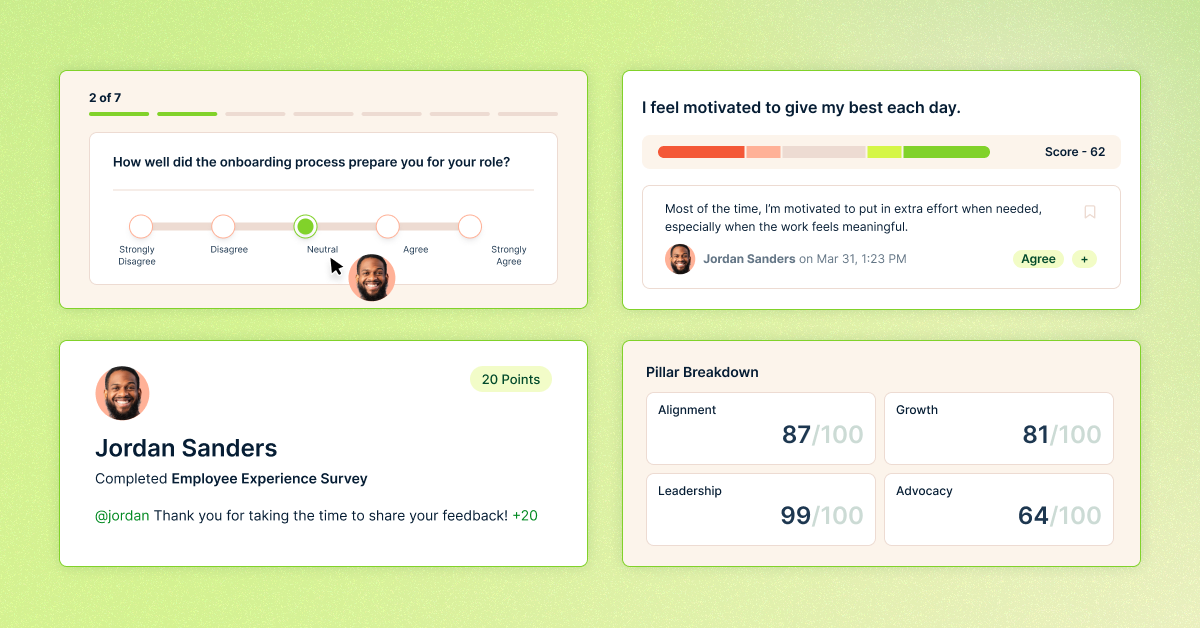11 Strategies To Encourage Manager Involvement In Employee Recognition

At Nectar, we recently surveyed 800 workers in the United States to gather employee recognition statistics. We asked survey respondents which group’s recognition had the most impact on them between CEO/Executives, managers, and peers. A whopping 40% of our respondents shared that manager recognition has the most impact on them.
Still, we often hear from potential clients that there is a recognition gap within their management teams. Some company managers love to give recognition, but it's not a priority for everyone. With so many stellar employees, companies need to create a recognition experience that feels equitable across the board.
So, let’s dive into some of the best strategies you can use to ensure that your managers are involved in the recognition process.
1. Make Sure Leaders Find Value In Employee Recognition
Consistent employee recognition starts at the top.
Our survey revealed that 33% of employees ranked recognition from the CEO/executive team as the most important. When your executive team values recognition, they set the bar for other company leaders.
Are your company executives talking the talk and walking the walk regarding recognition?
If your HR team has seen a need for an increase in employee recognition, talk with your executive team first. Here are a few employee recognition statistics you can share with company leaders:
- 83.6% of employees feel like recognition impacts their motivation to succeed in the workplace.
- 77.9% of workers would be more productive if recognized more frequently.
- 81.9% of employees agree that recognition for their contributions at work impacts their engagement.
Our data also found that employees are less likely to get recognition from the company CEO and executive team, even if they enjoy receiving it. A whopping 28% of employees never get recognition from this group, and that number can go as high as 36% for women. If you'd like to involve your company's CEO, connect with their Chief Of Staff to help them understand the importance of recognition. This team member can advise them on why they should invest in giving recognition and help them create a plan to give praise more often.
Check out our recent employee recognition survey for more statistics you can share with executives and company leaders.
2. Train Managers On The Value Of Great Feedback
Once your company executives are on board, it's time to train your managers. As we've shared, companies often come to Nectar because they notice a gap in how managers treat recognition. Some managers are naturally better at sharing credit than others, but everyone can learn. Increasing recognition is often a training or time management issue if you've hired quality managers.
Here are a few techniques that you can teach managers to understand the value of recognition:
Reflection
The first technique you can use to train your managers is teaching them the art of reflection. At the end of each week, running through a list of prompts can help unearth ideas of who to recognize.
For example, try these recognition-boosting prompts:
- What was your biggest win of the week? Who helped you make that win a reality?
- Who has impacted you most since you joined the company? Consider the different types of impact a person can have, such as the impact on your success rate, work ethic, happiness, etc.
- Who works hard and deserves more praise in your organization?
- Who embodies your company's core values?
- When making decisions, is there someone who always reminds you to think about the bigger picture, the company vision, or the mission?
Time-Blocking
Next, it's crucial to make room for recognition, even if it seems like an easy task to accomplish weekly. When we shared about building an employee recognition habit on the GoCo blog, we discussed the importance of making room for functions like praise. Managers are busy people, and if they don't set aside time for this practice, it might never get done.
Encourage your frontline managers to set up a weekly 20-30 minute block on their calendars. During this time, they can write thank you notes, shout out employees in a company communication channel, or have 1:1 appreciation chats with their team members.
Habit Stacking
In his book Atomic Habits, James Clear discusses the importance of habit stacking.
“One of the best ways to build a new habit is to identify a current habit you already do each day and then stack your new behavior on top.”
There might be weekly or daily habits that your managers already do, such as having a one-on-one with their staff members or conducting a weekly team meeting. What if you asked them to attach recognition to those activities? For example, take five minutes to praise your workers after each team meeting. After a few weeks of habit stacking, praising employees will become second nature to your people leaders.

3. Reward Recognition Champions At Work
Do you have any recognition ambassadors at work? Employees who always share the love and ensure their team gets the credit they deserve? These individuals are worth celebrating and rewarding.
If you have recognition champions at work, make sure they are getting the recognition they need to keep evangelizing this process. Send your champions a quick thank you note, a gift card to their favorite restaurant, or another small token of your appreciation.
When you make these individuals feel appreciated, they'll continue to share their team wins with the entire organization. They'll also talk about the fun distinctions they've received, making other team members want to get involved. Fear of missing out will make other employees want to follow in their footsteps.
4. Learn From Employees Who Receive Recognition Often
Everyone wants to lead a successful team. Since recognition can often lead to more productivity, it might be great to prove these statistics with internal data. This information can be a game-changer for managers who love analytics and follow data to become more strategic partners at work.
Analyze employees who often receive recognition from their managers and peers. You can find these people by looking at any formal recognition programs your company has or through anecdotes. For example, if your organization has a program like employee of the month, you can easily find top performers by checking out award winners.
Based on the employees you find, you can dig into their work history to see stats like:
- What work do they get done compared to other team members?
- How do their teams do in comparison with other groups?
- How involved are their managers when it comes to recognition?
Once you have this data, share it with other managers. For example, you could put together a quick document or deck about the habits of high-performing workers.
5. Offer A Specific Company Recognition Budget To Each Manager
Recognition can be cheap, but it typically has some cost to it. Whether you want to write a handwritten thank you note or throw a party for your team, it can get expensive. When other things need to be paid for, it can be easy to put recognition on the back burner. Are you expecting your managers to prioritize praise when they need to use their budget for other essentials?
When you use a tool like Nectar, you can make recognition a company-wide initiative and give each manager a certain number of points for praise. Budgeting for recognition and rewards spending can be challenging, but some basic insights can help you give leaders the tools they need to recognize their team (and employees across the organization.)
At Nectar, we recommend a manager budget of at least $10 per month plus an additional $1 per direct report when using a digital platform.
Example: If Allison is a manager with ten direct reports, she will receive $20 per month or $240 per year to recognize her team and other employees.
Your budget might look slightly different if you run a manual recognition process. It's essential to keep an eye on recognition spending if you plan to keep your process manual because your budget can quickly balloon if you don't have a straightforward spend management process.

6. Call Out Team Recognition During Meetings
Who wouldn't want to get called out for their team's fantastic work? By attaching a manager to the impact their team is having on the organization, you can feed the manager's ego while giving some much-needed recognition to their team.
Here’s how this might look:
“Eli’s marketing team is doing well right now. Recently he shared how Paul is making big leaps with our new website and Stacey has now reached 10,000 followers on LinkedIn.”
Pull these double recognition moments from their staff shoutouts to encourage managers to give recognition. Then, instead of recognizing the team for them, you'll amplify their work to appreciate their team.

7. Hold An Employee Recognition Challenge For Managers
Have you ever participated in a challenge? Whether you want to exercise or read more books, challenges can be a great way to get involved in something new. If you want your managers to get involved in recognition, why not make it fun? A challenge can be a great way to push your team beyond their comfort zone regarding appreciation.
You can pose several challenges to your management team, but it should be about building a consistent habit. For example, you might give a small bonus to any manager who can praise 100% of their team for three months.
You can keep the reward for a challenge small, too. Something as simple as a $10-$15 gift card can get your managers excited about giving more recognition.
8. Recognize Your Managers
While you work to get managers involved in employee recognition, are you recognizing your managers for their accomplishments? Most managers have their own set of tasks they need to complete. So, you should spend your time making sure each manager feels supported and appreciated.
Appreciation is something that people often pay forward. Once you get a stellar piece of feedback, you want others to feel just as nice. Recognizing your frontline managers will make them excited to share the love with their team. On the other hand, it's hard to tell managers to do something you don't do. If you don't acknowledge your team, why should they recognize theirs?
If you are battling your to-do list, use some of the strategies we shared earlier to make this a priority. For example, simply blocking out 10-20 minutes per week can help you make time to engage your managers.
Encourage Individual Contributors To Give Recognition
Managers should hear how great they are from the bottom up too. As your managers get better at giving recognition, you should do what you can to sustain their interest. One way to do this is to ensure individual contributors also give credit to managers.
Here are some ways to encourage individuals to celebrate their leaders:
- Leave space in team meetings for everyone to share who they are thankful for that week.
- Create an internal manager appreciation day holiday for your company to observe and involve individual contributors.
- Use moments like work anniversaries and employee birthdays to celebrate your managers and get their direct reports involved in setting it up.
9. Check-In With Managers Who Are Slipping With Recognition
Do you notice any leaders who need to acknowledge their employees? Are people sharing these sentiments in exit interviews or engagement surveys? You can typically spot managers slipping with recognition based on team behavior or technology (for example, Nectar gives you insight into how each manager deals with recognition each month.)
Once you know a manager is slacking with recognition, it's important to intervene. One of the easiest ways to do this is to send a quick message to each manager.
“I’ve noticed that your team is receiving less recognition than other departments. Your team has accomplished some stellar results this month. Which wins come to mind first? Make sure you use our internal appreciation channel to send a shoutout.”
As we've shared, managers want to recognize their team. Other responsibilities just might be more pressing. A quick message like this can remind employees about the importance of appreciation.
10. Share The Recognition Experience With Managers
While managers play an essential role in employee recognition, they are not the only source of credit that employees value. In fact, 60% of the full-time employees we surveyed reported valuing recognition from the CEO/executives or their peers the most. So, while managers should play a prominent role in this employee experience process, they shouldn't be the only people in charge of it.

It's crucial to get your CEO/Executive team just as involved while investing in peer-to-peer recognition programs. When praise comes from all directions, every employee will be happier with the company culture your organization is building.
11. Invest In The Right Technology That Makes Recognition Easy
Lastly, companies need to give managers the tools they need to make recognition easy. Let's face it, remembering to spend time on praise can be challenging. When you're a manager, there are always a million fires to put out, on top of ensuring that your own tasks get done. As a result, it can be hard to be forward-thinking and consider the implications of how giving credit can impact your company's tenure.
Most managers are just reacting and trying to stay present. However, technology can make praise an easy win for companies that want to improve engagement.

Companies can use many tools to improve employee recognition, but we must share our software here. Nectar is a top employee recognition and rewards platform.
While we can go into detail about our product as a whole, here’s how we make your managers’ lives easier. If you want a quick rundown of our platform, check out our tour. When you're ready to see a complete look, request a demo. Our sales teams will be happy to walk you through our platform and answer your questions.
Birthdays/Work Anniversaries
Birthdays and work anniversaries bring up a lot of emotions for employees. Many of your team members will use these times to reflect on their journey. Some of your team may uncover that they aren't in a role or company that serves them anymore. Having a positive experience during these dates can make a massive difference, as research has shown that these dates are correlated with turnover.
However, remembering birthdays and work anniversaries can be daunting, especially as your team grows.
Nectar has an automated system that administrators can set up to give every employee a birthday and work anniversary shoutout. We also email managers before someone on their team has a birthday or work anniversary. Then, if managers want to add to the automated shoutout or create one of their own, they can easily do so.
Above all, your employees will always have their birthdays and work anniversaries celebrated. This takes a ton of pressure off managers to focus on other aspects of their job.
Team Analytics
Are you giving your managers the analytics they need to run their recognition programs? Nectar has a great set of administrator analytics that allow executives and HR leaders to see the company as a whole, but we also offer team insights. Managers can see the:
- Percent of their team they’ve recognized in a given period.
- Web of recognition happening on their team, including how they've recognized team members and the praise happening between them.
- Core values being used to recognize the team as a whole and specific employees in the department.
Offering a simple analytics dashboard allows managers to take ownership of this process. Instead of credit going on the back burner, they have an easy-to-access place to learn about their team's success (and where they can improve.) For example, if your team is getting a ton of shoutouts for one core value but missing the others, you could educate your team about why the other values are important and how to showcase them.

Awards
While ad hoc credit is valuable, there's something to be said for more prestigious awards like Employee Of The Month. Workers often value these types of awards because it's easy to explain to others outside the organization they are working for.
Nectar offers an easy-to-use awards experience for managers. Nectar administrators can give managers a certain number of awards to give out monthly, quarterly, or yearly. These awards become a simple way to engage team members and keep the appreciation flowing.
Shoutouts In Teams/Slack
If you use a tool like Teams or Slack, you know that you can often find yourself living inside those communication channels. Managers spend a good portion of their day within these tools, so being able to give shoutouts from Teams and Slack makes giving recognition easy.
When you work with our best-in-class customer success team, they can help you set up Nectar inside the chat tool your company uses (or both if you happen to have groups living inside both.)
Once Nectar lives inside your communication tool, you are never more than a few clicks away from giving a shoutout or viewing the praise happening inside your organization.
Do you want to see what other tools we can connect with? Check out our integrations.
Department-Based Challenges To Increase Engagement
Are your managers tasked with developing talent or rewarding team members who go above and beyond? Our challenges feature can help your company reward many behaviors, such as:
- Taking an industry-related course.
- Going to get an annual physical done.
- Referring a new employee.
- Organizing a team activity.
- Walking 10,000 steps in a day.
Companies can create challenges everyone can participate in, but managers can also build out team-specific challenges. For example, imagine a sales challenge for the first person to close a deal that month or an engineering challenge to release your first in-app feature. Leaders can easily create these types of challenges in their Nectar accounts.
At Nectar, one of our favorite challenges is the weekly exercise challenge or the LinkedIn brand-building challenge we have. Both challenges have helped employees earn thousands of points while making us healthier and building our presence on LinkedIn.

Conclusion
Let's face it. Employees want recognition and appreciation for the work they do. Managers are often the best people to give this feedback because they have insight into what happens in their department. Unfortunately, there are often other issues and tasks managers must focus on, and giving positive feedback often falls to the bottom of a never-ending to-do list.
Thankfully, there are strategies that companies can use to get managers more involved in the recognition process. From making sure leaders find value in recognition to investing in technology, after reading this article, you should be well-prepped to tackle this issue today.
Are you ready to take praise to the next level at your company? Request a demo of Nectar, and our sales team can help you build an employee recognition program that your team members will love.














